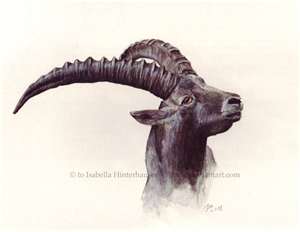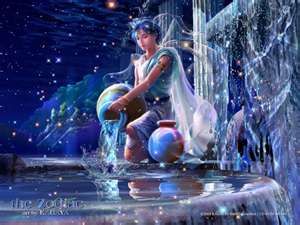Saturn’s Mythological Background
From ‘The Sun In Capricorn’

The mythological background of the planetary ruler of each sign can reveal a great deal about the evolutionary pathway of the human soul in general terms, as well as some of the character traces that are typical for the souls that are born into them.
Saturn is the planetary ruler of Capricorn. In sheer mass and size this planet is the second largest one in our solar system and in the order of distance from the Sun it comes in sixth place. Saturn’s dimensions are almost equal to those of Jupiter although in mass it is about three times smaller and it has the lowest mean density of any object in our solar system. Both Saturn and Jupiter resemble stellar bodies, because their bulk chemical composition is dominated by the light gas hydrogen. In Roman mythology Saturn represented the God of agriculture and harvest, of sowing and of reaping. Pictures of him usually showed him as bearded and carrying a sickle or an ear of corn. Saturn is known as the planet of Karma. This is a powerful symbolism that reminds us that the law of Karma ensures that as we sow, so we shall reap. Saturn’s Greek counterpart was the agricultural deity Cronus or old Father Time himself, a name by which Saturn is also known.
One of the main Roman festivals was known as the Saturnalia. Lasting seven days, it was a celebration of the Golden Age which, according to legend, Saturn had once ruled. We shall return to this theme in the Sun in Aquarius. A special feature of the Saturnalia feast was that temporary freedom was given to all slaves. It was a time when they were served by their masters and given first place at the family table. The Christmas and New Year celebrations of the Western world still echo the influence of this ancient festival. Originally, it lasted only one day and took place on 17th December; at a later stage this was extended to seven days. It was the merriest festival of the year. All work and business were suspended; slaves were given the short-term freedom of saying and doing what they liked; certain moral restrictions were eased; and presents freely exchanged. Saturday took its name from Saturn, the Romans called it dies Saturni. It is the only day of the week to fully retain its Roman name in the English language.
According the legend, Saturn was the husband of Ops, Goddess of plenty and the father of Jupiter, the ruler of the Gods; Juno, goddess of marriage; Neptune, God of the oceans; Pluto, God of the dead; Ceres, Goddess of the grain; and Veritas, the Goddess of truth and the mother of virtue. She was believed to hide in the bottom of a holy well, because she was very elusive. That’s where she still is most of the time, these days! Her hiding place is of special interest. Pictures usually show her as a young virgin dressed in white. The name Veritas was given to the Roman virtue of truthfulness; it was considered to be one of the highest virtues a good Roman could possess. Nothing has changed there; the same principle undoubtedly still applies to us and our time. Can you recognise the symbolisms in the Gods and Goddesses of times gone by and how they can still speak to us and our world?
From ‘The Sun In Capricorn’
![]()
From ‘The Sun In Aquarius’

Aquarius is co-ruled by the planets Saturn and Uranus. In Roman mythology, Saturn was the ancient God of agriculture; his Greek counterpart was the God Cronus. Zeus was the son of Cronus, who eventually usurped and dethroned his father. In Roman mythology Zeus was represented by Jupiter. Cronus is said to have fled to Italy, where he ruled during a Golden Age of perfect peace and happiness.
The vision of the Golden Age may be a dream, but it is one that makes life worth while even if it can never be realised; indeed, it makes life worthwhile just because it can never be realised,’ Fyodor Dostoyevsky, 1821 – 1881, said in one of his short stories. I cannot share that opinion because I do believe with all my heart and soul that the appearance of a new Golden Age is very much a reality and already in the process of happening. Obviously, we have by now drawn a good deal closer to this age than Dostoyevsky was in his time.
We shall return to Saturn in a moment, but first let us take a closer look at his co-ruler, Uranus, the seventh most distant planet from the Sun. Its low density and large size place it among the four giant planets that have no solid surfaces; each one is composed primarily of hydrogen, helium, water, and other volatile compounds. According an ancient Greek legend, when Gaia, the Goddess of the Earth, emerged from the primeval Chaos, she first gave birth to Uranus, i.e. the Heavens, and then to the Mountains and the Sea. As well as being her son, Uranus also became Gaia’s husband. Astrologically, Uranus to this day represents the will of God.
Back to Saturn, the much maligned planet who, in the olden days for a very long time had to endure an exceedingly bad press. Yet, if with the help of the link provided at the end of this chapter, you read ‘Saturn as the Teacher and Rewarder’ you will discover that his reputation as the great astrological villain is by no means justified. When you have studied it, like me, you will no longer allow anyone to say negative things about Saturn in your presence. Saturn stands as the guardian and keeper of the gateway into the Aquarian Age. He is a symbolism for the bridge of learning to control all parts of our being which every soul must cross of its own accord. Earthly and heavenly parts alike have to be mastered by us. And our energies have to be cleansed and purified of all earthly desires before any one of us can return into the perfect alignment with our eternal or God Self; to find it one day is every soul’s birthright.
The co-rulership of Aquarius by Saturn and Uranus explains the way forward into the New Age quite clearly, and the order in which the planets are appearing is of particular significance. Saturn, the strict disciplinarian comes first; Uranus, the destroyer of false beliefs is the liberator who follows behind; more about him in a moment. All those who are willing to undergo the cleansing process and show their readiness by behaving in an unselfish and disciplined manner, and that at all times, Uranus releases into the freedom of the Aquarian Age. He is waiting to help us burst all Karmic chains and shackles of past ages and by bringing us God’s Divine truth that flows directly from His/Her loving heart into the individual and collective consciousness of our world, he assists us in shaking off all false beliefs and prejudices.
Recommended Reading:
• ‘When Creation Was Began, According To the Legend of Uranus and Gaia – A Tale for the Aquarian Age’
* * *
The above is part of ‘Everything That’s Worth Knowing About The True Meaning Of Saturn’
.If it has whetted your appetite to read more, please follow the link below:
‘Everything That’s Worth Knowing About The True Meaning Of Saturn’
![]()
